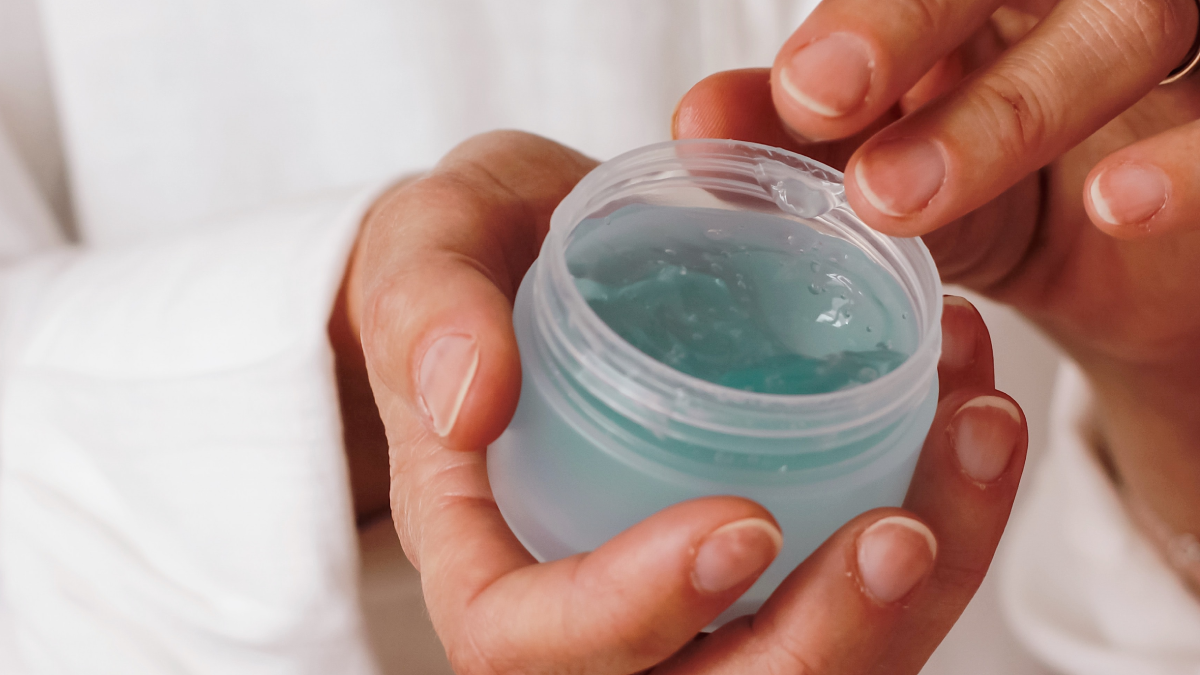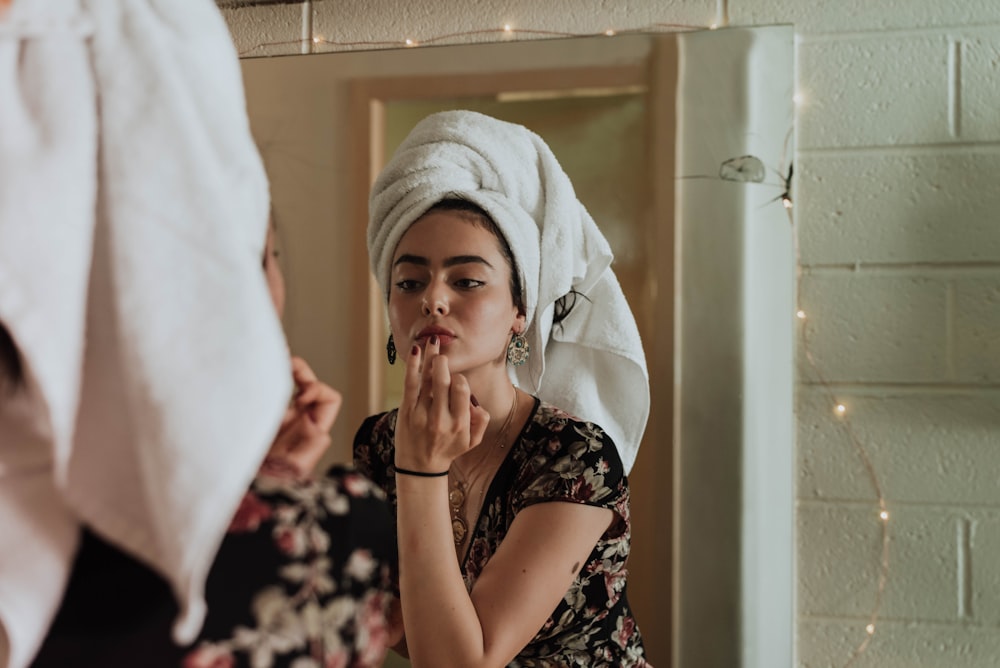
You’ve probably already used glycerin for skincare purposes, as it’s one of the most common ingredients in today’s beauty products – especially in moisturizing products. However, you may not be aware of how many other glycerin skin benefits there are, aside from its moisturizing qualities. For example, many people are unaware of glycerin’s anti-ageing benefits for the skin and its healing properties, but more on that later.
Glycerin is an ingredient many people are curious about because it’s so often seen in the ingredients list of both top skincare lines and drug store brands.
If you’re someone who reads the ingredients before buying skin care products (which you absolutely should) then you’re likely used to seeing glycerin in the list of ingredients.
When you shop for skincare products, you’ll probably read “glycerin” on the label for most of the most popular skin products. But how much do you really know about glycerin? And are you using the right type of glycerin for your skin?
In this article, we’ll cover what glycerin is and where it’s derived from, 15 benefits of glycerin for skin, how to use glycerin on skin and which type to use, and the skin types it’s best for. We’ll also cover some frequently asked questions about glycerin in skincare.
What is Glycerin? What is it Made of?

Glycerin is a commonly-used, organic sugar alcohol compound found in many skin care products. Glycerin is a clear, mild, and odourless liquid substance with a syrup-like consistency. It has a neutral smell and a sweet taste (not that we recommend eating your face cream!)
Natural and organic glycerin is most commonly derived from animal fats or extracted from plant oils such as soybean, coconut or palm oils. Synthetic glycerin, which has fewer skin benefits than natural glycerin, is derived from petroleum.
Vegans are always looking for skincare products that contain vegetable glycerin, which would be the glycerin derived from plant oils rather than from animal fats. Luckily for the vegans out there, vegetable glycerin is the best form of glycerin to use.
Many natural plants produce moisturizing fatty acids, anti-inflammatories, and antimicrobials. This is why botanical extracts such as vegetable glycerin are often used in skincare products.
In addition to being widely used in skincare products, glycerin is also commonly added to soaps, deodorants, toothpaste, makeup, and many other household products.
Glycerin is a lipid. A lipid is a fat found in animals and vegetables. Fun fact: Glycerin even occurs naturally in humans.
This organic compound was used throughout ancient history in herbal medicine. The word “glycerin” comes from the Greek word “glykys” which means “sweet”. Glycerin was first discovered in 1779 by the Swedish chemist, Karl Wilhelm Scheele, who referred to it as the “sweet principle of fat.” Today, it is most commonly referred to as glycerin, glycerine, or glycerol.
15 Benefits of Using Glycerin for Skin
There are a plethora of glycerin skin benefits that will encourage you to use glycerin on your skin. Below are 15 of the top benefits of glycerin for skin:
1. It’s Highly Moisturizing
There’s a reason why people with dry skin love using skincare products that contain glycerin. Dr. Tsippora Shainhouse, a board-certified dermatologist at SkinSafe Dermatology and Skin Care in Beverly Hills, explains: “Glycerin is a humectant, which means that it’s highly moisturizing and attracts water from both the environment and the deeper dermal skin layers, bringing it to the top layer of skin.
Glycerin has been demonstrated to mimic the skin’s NMF (natural moisturizing factor), a group of components that help maintain moisture in the skin. Your skin’s NMF is easily lost with repeated or harsh skin washing and is reduced or completely absent in skin conditions such as xerosis (dry skin), atopic dermatitis, ichthyosis Vulgaris and psoriasis. Skin that is deficient in NMF will present with areas of dryness, scaling, flaking or even cracking. As NMF is a component of all healthy skin types, glycerin is helpful for most skin types, especially dry skin.”
2. It Promotes Skin Regeneration
Glycerin promotes skin regeneration and can help superficial skin cells mature faster. This contributes to a more youthful appearance, softer skin, and smoother skin.
3. It Softens
By helping shed dead skin cells, glycerin makes your skin softer and smoother. Dr. Rashmi Singh, a board-certified dermatologist, says that glycerin helps with skin ‘turnover’ by encouraging dead skin layers to shed regularly and exfoliate naturally, thereby “unveiling the smooth supple skin underneath.”
Vegetable glycerine on the skin also acts as an emollient, which means that it helps to soften and hydrate skin.
4. It Won’t Irritate Your Skin
Glycerin is gentle and non-irritating. It won’t aggravate any existing skin conditions and it can even soothe any existing skin irritation, and reduce skin redness.
5. It Protects

This is an ingredient that promotes better skin health by creating a protective barrier on your skin. It shields your skin from harmful environmental elements such as cold air, harsh winds and air pollutants. In other words, glycerin improves the skin barrier function.
6. It Heals
This organic compound possesses the ability to speed up the healing of wounds, rashes or burns on the skin, and it soothes skin inflammation. This is especially true of vegetable glycerin.
Glycerin can even act as a natural medication for skin conditions such as eczema and psoriasis. It has many reparative and healing properties.
7. It Soothes
Vegetable glycerin is an ingredient that can soothe itchy or sore skin, making you feel less discomfort. It can act as a salve that cools and calms irritated skin and can be very soothing if applied after you experience a sunburn or bug bites.
8. It’s Anti-Aging
The fact that glycerin is a humectant and is effective in restoring and retaining moisture in the skin means that it also contributes to a more youthful appearance. It improves the elasticity of the skin, fills in lines and wrinkles, and smoothes the skin.
9. Antibacterial and Antiviral Properties
Glycerin can treat a variety of skin conditions due to its antibacterial and antiviral properties. Speak to your dermatologist if you have a skin condition that is causing you discomfort.
10. Non-Toxic
Glycerin is safe, mild and non-toxic, especially if you opt for vegetable or plant-based glycerol. Sometimes, the label of your skincare products will just say “glycerin” and won’t specify whether it’s synthetic or plant-based glycerin. Many of the top skincare lines produce products that contain vegetable glycerin, a kosher plant-based form of glycerin that is great for your skin. You can typically find this information on the label or on the brand’s website.
11. It Can Double as a Skin Primer.
Because of glycerin’s ability to smooth out the skin and fill in lines, wrinkles and creases, your facial moisturizer containing glycerin can double as a primer. Using it on your skin can help your makeup go on smoother and more evenly.
12. Evens Out Skin Tone
Glycerin evens out the skin tone to lighten darker areas and reduce redness in irritated areas, thereby creating a more even skin tone.
13. Very Lightweight and Feels Amazing on the Skin

Glycerin is lightweight and it, therefore, won’t feel heavy, uncomfortable or greasy on your skin. It will feel comfortable and amazing.
14. Helps Your Skin Absorb Other Beneficial Ingredients
The ingredient of glycerin facilitates the skin’s absorption of other beneficial active ingredients in your skincare products. Dr. Shainhouse explains, “Glycerin pairs well with beneficial active ingredients including antioxidants, retinoids, alpha and beta hydroxy acids. Glycerin can also be used to buffer the effects of some harsher active ingredients, by providing soothing moisture to the skin, to minimize the potential for skin irritation.”
15. Does Not Clog Pores
Glycerin is non-comedogenic, which means it won’t clog your pores.
What Skin Type is Glycerin Good For?
Dry:
Glycerin is gentle enough for all skin types, and it is especially ideal for those with dry skin. Below is a breakdown of the specific benefits of glycerin for each skin type:
Glycerin is a humectant, which means that it acts as a moisture magnet. It moisturizes the skin by attracting water from the air and retaining that moisture. Any ingredient that attracts and retains moisture is great for dry skin, which is why dry skin types should opt for skincare products that include glycerin in their list of ingredients.
Humectants can also draw moisture from deeper layers of your skin and bring it to the top layer of your skin, while also trapping that moisture and sealing it in so that your skin stays hydrated all day.
Oily:
Glycerin is good for oily skin, too, because it adds moisture to the skin without adding oil, and it is non-greasy.
Combination:
Glycerin is suitable for combination skin because it will moisturize the dry areas of your skin but will not add any oil to the oily areas.
Acne-Prone:
Those with acne-prone skin use skincare products with glycerin because glycerin is non-comedogenic and doesn’t clog the pores (and we all know clogged pores cause breakouts!) Glycerin also possesses the ability to unclog pores and prevent bacterial growth that would otherwise contribute to the development of acne.
Sensitive:
Those with sensitive skin use it because it’s gentle and non-irritating. It can even soothe inflammation and skin redness. It’s still always best to test it on a small patch of skin first, though. Its pH level closely matches the pH of your skin, which means that it’s gentle enough to be used by those with sensitive skin types.
Mature:
Glycerin is good for mature skin because anything that is highly moisturizing and facilitates cell regeneration, like glycerin, is going to help prevent skin ageing. This ingredient also protects your skin from harsh elements and pollutants that contribute to the ageing process if your skin is left unprotected. Glycerin can help prevent photoaging and improve uneven skin tone or dark spots caused by years of sun exposure.
How to Use Glycerin

To use glycerin on the skin, choose skin cleansers, face creams, moisturizers and skin serums that have glycerin in them (preferably, plant-based or vegetable glycerin.)
Glycerin works best when combined with other ingredients to create a balanced skincare formula. Dr. Deborah Longwill, a board-certified dermatologist based in Miami, advises buying skincare products that contain glycerin, rather than attempting to make an at-home skincare remedy. She explains, “I wouldn’t recommend any DIY glycerin treatments. Our skin is very sensitive and how much you apply is crucial. I recommend the best option is to look for effective products that contain the ingredient rather than trying to create it at home.”
Vanessa Thomas, a cosmetic chemist with over 20 years of experience formulating cosmetics, sunscreen and skincare, agrees that using glycerin in skincare products is the way to go. “Glycerin should not be used alone or in full concentration, as it could irritate the skin on its own. However, it generally does not irritate the skin if mixed with other ingredients in skincare products such as serums, moisturizers, and facial cleansers.”
Never use glycerin on its own. Iva Teixeira, CEO and Co-founder of The Good Face Project, explains: “Glycerin should not be used as a single-ingredient skincare product. The way to incorporate it into one’s regimen is simply by favouring serums and moisturizers that contain glycerin along with other beneficial ingredients.”
How to Incorporate Glycerin in Your Skincare Routine
To use glycerin in your skincare routine, apply the following products to your skin, in the following order:
1. Cleanse your skin using a facial cleanser that contains glycerin, such as Zo Skin Health’s Hydrating Cleanser.
2. Use a toner.
3. Apply eye cream with glycerin in it such as Dermalogica’s Total Eye Care with SPF, and also apply a moisturizing serum containing plant-based glycerin such as Dermalogica’s Multivitamin Power Serum.
4. Apply moisturizer that contains plant-based glycerin. (Try Drunk Elephant’s Rescue Moisturizer)
5. If it is daytime, apply sunscreen as a final step.
Apply these products to your skin in the morning, and before bed. If you can, apply products with glycerin directly after showering. When your skin is damp, it retains the most moisture.
The glycerin is able to seal in the moisture from your shower because it can hold several times its weight in water.
Other Frequently Asked Questions About Glycerin and Skin Care

You probably still have some questions about glycerin for the skin. Below, we have answered some common questions about glycerin for skincare:
Is Glycerin Safe to Use on the Skin?
Yes, glycerin is a gentle, non-toxic and non-irritating ingredient that is safe to use and has many skincare benefits.
As far as side effects go, Dr. Shainhouse explains: “Glycerin has no specific side effects when used topically unless someone happens to have allergic contact dermatitis to it. It does not generally cause skin irritation, redness, swelling or peeling. If you do notice any uncomfortable or allergic or inflammatory skin reactions when using topical glycerin, discontinue use and see your dermatologist for evaluation. Always start off with a small patch test.”
Can I Use Glycerin on My Face?
Yes, glycerin can be used on the face and it is a common ingredient in many facial cleansers, eye creams and moisturizers.
Can I Use Glycerin on My Lips?
Yes, glycerin is safe to use on your lips and many lip balms and lip salves contain glycerin due to its moisturizing properties. It can treat dry, chapped lips due to its hydrating and soothing benefits. It’s also an emollient, so it can help soften your lips.
Can I Use Glycerin on My Feet?
Glycerin can certainly be used on your feet. It is an excellent remedy for dry feet and cracked heels. Glycerin can also be used on the hands and body.
Is Glycerin Vegan?
Yes, glycerin is vegan if you use plant-based or vegetable glycerin instead of using glycerin derived from animal fat. Whether you shop online or in-store, always look at the list of ingredients to ensure that the type of glycerin being used is vegan and that all other ingredients in the product are also vegan.
Is Glycerin Good for Your Skin?
Yes, as you probably guessed from our list of glycerin skin benefits, glycerin is great for your skin. Incorporating it into your skincare routine is a good idea, but as we mentioned, always do a patch test first, just in case you have an unknown allergy.
Glycerin is good for your skin because it promotes overall skin health, it’s hydrating, and improves skin barrier function to protect your skin from bacteria, pollutants, and harmful environmental conditions.
Need a Personalized Skin Health Report?
CircleDNA can provide you with a personalized skin report based on your genetics. If you want to learn more about your skin and how to properly take care of it, order the CircleDNA kit here.






